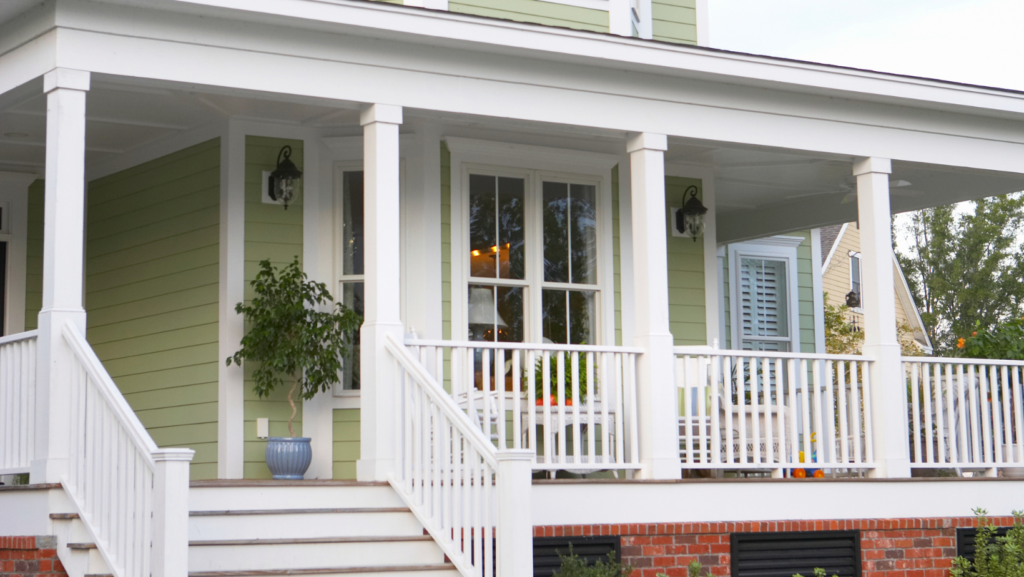We all know that fall in New Jersey comes with a beautiful array of color, and the cool, crisp weather makes us want to spend as much time outside as possible. It might be a great chance to get cozy and enjoy a break between summer and winter extremes, but it’s also the perfect time to touch up your exterior paint.
In fact, it’s a key maintenance opportunity. Catching issues NOW, before the winter weather hits, can be invaluable.
Understanding New Jersey’s Unique Climate
New Jersey experiences a mix of weather conditions, each presenting distinct challenges to the exterior of homes.
Hot and Humid Conditions: The combination of hot temperatures and high humidity (characteristic of New Jersey summers) can have a negative impact on exterior paint.
Coastal Areas: If you live along the Jersey Shore, proximity to the ocean can expose your home to salt air and sea spray. These conditions can accelerate paint deterioration and corrosion.
Heat Waves and Paint Stress: During heatwaves, extreme temperatures can stress exterior paint, potentially leading to early degradation.
Preserving the Appearance and Longevity of Your Exterior Paint
Here are a few things to keep in mind for this coming fall season:
- Regular Cleaning: In any environment, but especially in a varied climate like New Jersey, exterior paint accumulates dirt and grime. Over time, this can diminish its original color, plus shortens the lifespan of your paint and stain. Routine power washing can help maintain the color’s brightness and prevent mold and mildew.
- Sealing and Protective Coatings: The sun’s UV rays can gradually fade paint, and New Jersey’s humid summers can make the problem worse. Using protective sealants and coatings not only shields the paint but also preserves that original color you fell in love with.
- Timely Touch-ups: Due to natural wear and tear, some areas might show signs of paint distress before others. Addressing these spots promptly, with timely touch-ups, can prevent larger sections from requiring re-painting and help the exterior maintain a cohesive look.
- Professional Inspections: The early signs of paint failure can be subtle. Regular inspections by professionals can identify and address problems, saving you from more extensive repairs in the future.

Choosing the Right Paint
Choosing the right paint is a big deal, and plays a significant role in how long it lasts. Keeping the environmental conditions we mentioned in mind, you need a product that’s designed to withstand humidity, intense sun, and temperature fluctuations. Fair warning: it might cost more up front, but the long-term value will more than pay you back down the road.
Here’s a quick overview of the types of products you have to choose from:
- Acrylic Latex Paint: This type of paint is versatile and can handle the humidity and temperature fluctuations of New Jersey. It dries quickly, resists cracking, and is durable. It’s a good option for both interior and exterior surfaces.
- Exterior Oil-Based Paint: Oil-based paints provide a hard, durable finish that can stand up to harsh weather conditions. They are resistant to moisture and temperature changes, making them suitable for New Jersey’s climate. However, keep in mind that oil-based paints can take longer to dry and may have stronger odors.
- Elastomeric Paint: Elastomeric paint is a flexible coating that can stretch and contract with temperature changes. It’s especially useful for masonry and stucco surfaces, as it can help prevent cracking due to freeze-thaw cycles.
- Mildew-Resistant Paint: Given New Jersey’s humidity, choosing a paint with mildew-resistant properties is a good idea. These paints have additives that inhibit the growth of mold and mildew, making them suitable for areas prone to moisture.
Frequently Asked Questions
Q: How often should I have my home’s exterior paint inspected in New Jersey?
A: Given New Jersey’s diverse climate, a semi-annual inspection – post-winter and post-summer – is a wise choice.
Q: Are certain paint brands more apt for Cherry Hill’s weather?
A: Yes, there are paints formulated for coastal or varied climates. A local painting professional can provide brand and type recommendations.
Q: How do I clean my home’s exterior without risking the paint?
A: A gentle wash with a soft brush and a mild detergent usually does the trick. If considering power washing, always proceed with caution or hire a professional.
Q: Will touch-ups on older paint jobs look out of place?
A: With a skilled approach, touch-ups can blend seamlessly. Even with the original paint, professional expertise can help account for color changes due to aging.
Q: Why is gutter maintenance vital for paint care?
A: Properly functioning gutters prevent potential water damage to the walls below, which in turn helps maintain the quality and longevity of the paint.

